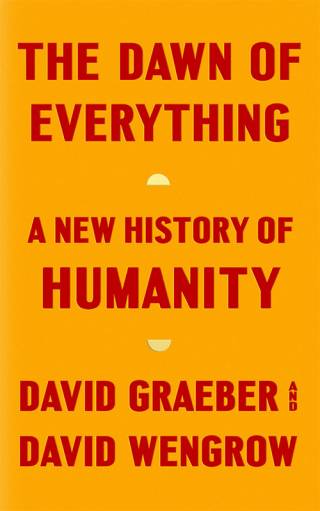The Dawn of Everything: A New History of Humanity
5 October 2021
David Wengrow (UCL Institute of Archaeology) will take part in two special events to mark the publication of his new volume The Dawn of Everything: A New History of Humanity.

David's new volume (co-authored with the late David Graeber), is published by Penguin. From egalitarian early cities in Mexico and Mesopotamia to part-time kings and queens in Ice Age Europe, this ambitious new world history brings together the latest scholarship and archaeological evidence to tell a new story about the last 30,000 years, fundamentally transforming our understanding of the human past.
The volume overturns assumptions about the origins of inequality, showing how history contains many more hopeful moments than we’ve previously been led to believe and offers a path toward imagining new forms of freedom, new ways of organising society.
In two special events being held to mark its publication this month, David will discuss how the book came about.
At the first event, hosted online by LSE's Department of Anthropology and International Inequalities Institute on Wednesday 13 October (6-7.30pm), David will be in conversation with Alpa Shah, Professor of Anthropology at LSE. This online public event forms part of LSE’s Shaping the Post-COVID World initiative, a series imagining what the world could look like after the crisis, and how we get there. The event is free and open to all but pre-registration is required.
At the second event, being held at the British Library on Tuesday 19 October (7.30-8.45pm), David will talk to Emma Dabiri, as well as special guests including Ahdaf Soueif, about the ideas behind the book. This event will take place in the British Library Theatre and will be simultaneously live streamed on the British Library platform.

David Wengrow, Professor of Comparative Archaeology at the UCL Institute of Archaeology, is the author of three books, including What Makes Civilization? and is the recipient of a number of awards, including the Distinguished Visitor Award for 2019 by the University of Auckland, New Zealand. He conducts archaeological fieldwork in various parts of Africa and the Middle East and is currently leading collaborative AHRC-funded research on radical death and early state formation.
Further details
Updated: Media links
- The Atlantic (18/10/21)
- The Guardian (19/10/21)
- Harpers Magazine (11/21)
- The New York Times (31/10/21, updated 03/11/21)
- The New York Times (Opinion Guest Essay 04/11/21)
- The Observer (31/10/21)
- The Times (£) (15/10/21)
 Close
Close

